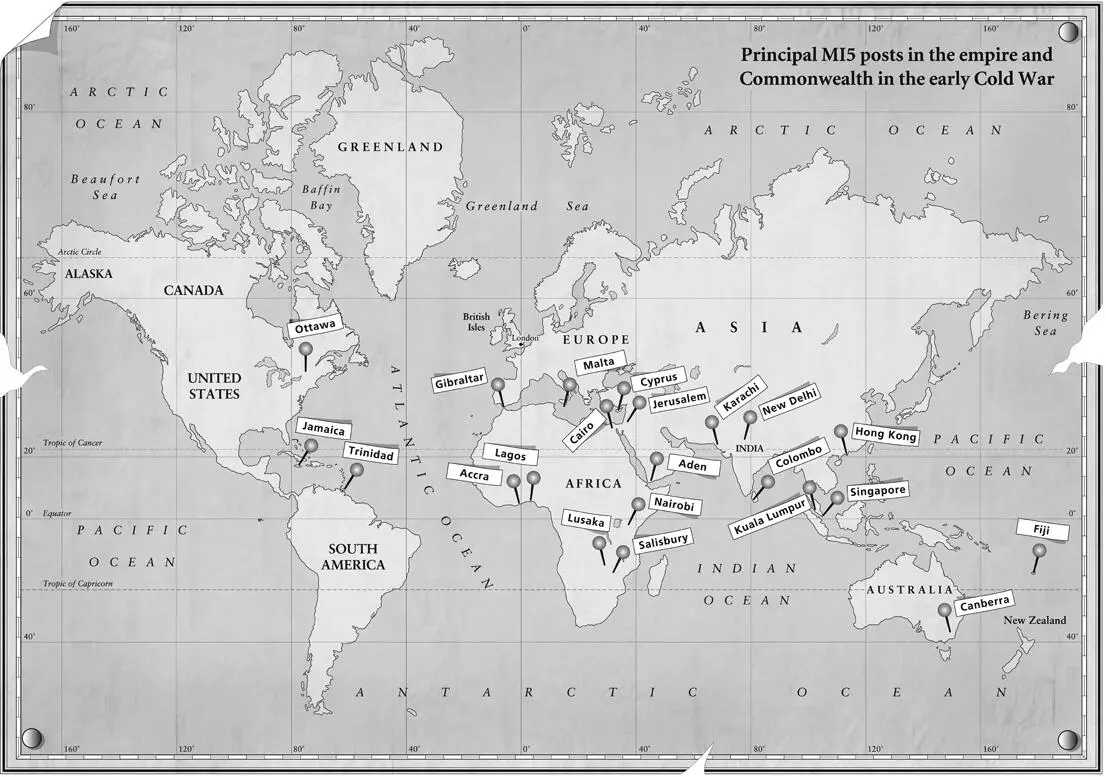HOWHome Office Warrant – MI5’s mechanism for mail and telephone interception
HUMINTHuman intelligence
IBIntelligence Bureau – Indian intelligence service, another name for DIB
IPIIndian Political Intelligence – Pre-independence agency in London responsible for intelligence on Indian affairs
JICJoint Intelligence Committee – ‘High table’ of British intelligence community
KGBCommittee for State Security – Soviet foreign intelligence-gathering agency
LICLocal Intelligence Committee – Regional colonial intelligence set up in colonies on MI5’s advice in early Cold War
MI5– British intelligence service responsible for counter-espionage, counter-subversion and counter-sabotage in British territory
MI6– Secret intelligence service responsible for gathering HUMINT from non-British territories
NSANational Security Agency – US SIGINT agency
RCMPRoyal Canadian Mounted Police – Canadian law-enforcement agency
SASSpecial Air Service – British special forces
Security Service– MI5
SIFESecurity Intelligence Far East – MI5 inter-service intelligence outfit in the Far East
SIGINTSignals intelligence
SIMESecurity Intelligence Middle East – MI5 inter-service intelligence outfit in the Middle East
SISSecret Intelligence Service – British foreign-intelligence-gathering service
SLOSecurity Liaison Officer – MI5 liaison officer in a colonial or Commonwealth country

In times of travail, Britain’s tendency was to rely more, not less, on spies. Her entire empire history urged her to do so. The thinner her trade routes, the more elaborate her clandestine efforts to protect them. The more feeble her colonial grip, the more desperate her subversion of those who sought to loosen it.
JOHN LE CARRÉ, The Honourable Schoolboy 1
On a cold morning in April 1947, a female terrorist slipped into the main headquarters of the Colonial Office in London. After politely asking a security guard if she could shelter from the chill indoors, she placed an enormous bomb, consisting of twenty-four sticks of dynamite, wrapped in newspaper, in the downstairs toilet, then calmly walked back out into the busy street and disappeared into the crowd. Her identity was not known at the time to either the police or MI5, but she worked for a terrorist ‘cell’ in Britain belonging to the Stern Gang, one of the two main paramilitary organisations fighting the British in Palestine. The explosives used for the bomb had been given to her by another Stern Gang agent, a wounded Franco-Jewish war veteran, known as the ‘dynamite man’, who had avoided detection by smuggling the dynamite into Britain in his artificial leg. The aim of these agents, and of other Stern Gang cells operating in Britain, was to use violence to force the British government into establishing an independent Jewish state in Palestine.
Even before this incident, MI5 had already been placed on high alert for possible terrorist outrages to be conducted in Britain. In the light of increasingly alarming reports from its sources in the Middle East, warning that Jewish paramilitaries planned to extend their ‘war’ against the British from Palestine to Britain itself, MI5 mounted intensive surveillance operations on known radical Jewish and Zionist groups in Britain. MI5’s investigations revealed a number of terrorist cells operating in London, whose members were planning bombing campaigns and assassinations of leading British politicians. In 1946 the head of MI5 briefed the Prime Minister that he and cabinet ministers were targets. That same year, another terrorist cell launched a letter-bomb campaign directed at every member of the British cabinet. All of the bombs, found to be potentially lethal, were successfully intercepted.
The bomb left in the Colonial Office was only detected after, by sheer luck, it had failed to go off because its timer broke. If it had successfully detonated, it would have caused carnage and chaos at the centre of Whitehall, probably on a similar scale to an attack that the other main militant group fighting the British in Palestine, the Irgun, had carried out in Jerusalem in July 1946, blowing up the King David Hotel and killing ninety-one people.
When the bomb at the Colonial Office was discovered, it led to an immediate Europe-wide search for the female Stern Gang agent, headed by MI5, SIS (MI6) and the London Special Branch. She was eventually apprehended in Belgium. MI5 also identified Irgun members operating in Britain, who were kept under surveillance or arrested. The head of the Irgun, however, remained at large, and continued to plan attacks against the British, in both Palestine and Europe. His name was Menachem Begin. He went on to become the sixth Prime Minister of the state of Israel, and the joint winner of the Nobel Peace Prize. 2
This episode is just one among a vast number of remarkable, and mostly undisclosed, security operations that Britain’s intelligence services were involved in during the period immediately after the Second World War, when Britain began to lose its empire. It has only recently been revealed through declassified intelligence records, and it not only adds a new chapter to the history of the early Cold War, but also has a chilling contemporary resonance. In a striking parallel with the world today, it reveals that the infiltration and radicalisation of a terrorist minority from the Middle East was experienced in Britain more than half a century ago. In fact, as this book reveals, in the aftermath of the Second World War the main threat to British national security did not come from the Soviet Union, as we might expect, but from Middle Eastern terrorism. However, the terrorists then did not come from Palestinian and Islamist groups, as they would do in the late twentieth century, and do today, but from Jewish (or ‘Zionist’) extremists. As Niall Ferguson has argued, terrorism is the original sin of the Middle East. 3
This book tells the secret, largely untold, history of Britain’s end of empire – the largest empire in world history – and is the first study devoted to examining the involvement of British intelligence in that story. Like Britain’s secret services themselves, it offers a global perspective: the agency responsible for imperial security intelligence, MI5, was involved everywhere in the empire where British national security was threatened – which in the early Cold War included almost all of Britain’s territorial holdings. It provides a panoramic tour of Britain’s declining empire after 1945, and the clandestine activities of the British government as this occurred. Its subject matter ranges from wartime espionage campaigns waged in the deserts of North Africa to shady back-channel communications with African dictators; from violent counter-insurgencies (or ‘Emergencies’) in the jungles of Malaya and Kenya, and the hills of Cyprus, to urban warfare campaigns in Palestine and the Arabian Peninsula. It reveals CIA plots and covert activities in British colonies, KGB assassinations, and failed coups sponsored by the British and US governments in the Middle East, primarily intended to secure oil and other natural resources.
Intelligence is the ‘missing dimension’ of the history of Britain’s end of empire (or ‘decolonisation’, as it is known to historians), which took place largely in the two decades after 1945. The activities of Britain’s intelligence services are conspicuously missing from almost all histories of that period. Part of the reason for this is perfectly understandable. During Britain’s rapid retreat from empire, the British government unofficially acknowledged the existence of MI5, but did not officially recognise that of SIS or GCHQ. This meant that there were no officially-released intelligence records for historians to study – it was obviously impossible for government departments to release records if the departments themselves did not officially exist. Intelligence was, therefore, quietly and subtly airbrushed out of the history books. 4
Читать дальше













